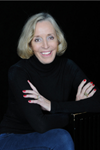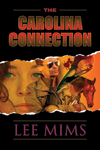 Like almost everyone she knows, Lee Mims started life as an infant. Though a skinny, wrinkled runt, her parents took her home anyway and raised her on their farm in Raleigh, North Carolina. As soon as she could walk, her two older brothers dragged her everywhere they went. They played outdoors from dawn to dusk, building forts, drinking water from garden hoses, and running with sticks. Until the obvious physical changes forced her to rethink, she was convinced she was their bony, somewhat weaker brother.
Like almost everyone she knows, Lee Mims started life as an infant. Though a skinny, wrinkled runt, her parents took her home anyway and raised her on their farm in Raleigh, North Carolina. As soon as she could walk, her two older brothers dragged her everywhere they went. They played outdoors from dawn to dusk, building forts, drinking water from garden hoses, and running with sticks. Until the obvious physical changes forced her to rethink, she was convinced she was their bony, somewhat weaker brother.
She mentions the weakness because, in truth, she was a sickly kid, stricken with constant bouts of croup. It was during these times of illness, while staying home with her mother, that she learned the beauty of words. She looks back on the tedium of confinement under a croup tent as being magical instead of boring all because her mom read to her. She read endlessly: short stories, poems, fairy tales, and adventure novels.
By the time she went to college, she’d left illness behind, but not her love of books. She also held on to her desire to be in the great outdoors, so when she went back to college the second time—the first didn’t take—and decided to build a career around it.
Eleven years and a marriage came and went before she received her master’s from UNC at Chapel Hill and became a field geologist for a large mining concern. Several years of drilling holes and finding quarries passed, and she became convinced her eggs were getting old and that if she ever wanted to have children, she needed a new husband. Imagine her delight in finding one who had a farm.
After twenty-five years of raising and training countless horses, two children, a multitude of dogs and cats and starting an oil portrait and fine arts business, reading books as an escape grew into a desire to write them, too. It seemed a shame to have as many careers as she’d had and not write about them.
Her first novel was a mystery involving the Quarter Horse industry. It took three years to write and wound up being about five-hundred pages. She saw the need for an editor. That’s when she really got lucky. All three of the editors who’ve helped her over the years—she started writing in earnest in about 2003—have been nurturing, stern, and yet encouraging.
She reworked that first manuscript three times, was turned down by every agent in New York and every publisher in the country who’d allow submissions without an agent—but that was okay. By then, her children had left for school, they’d closed the horse business, and she was more determined than ever.
She truly learned everything she knows about writing from her editors, by carrying out their revisions and reading the books—everything from grammars to practical how-to’s—they suggested. When she finally got a break and a publishing company wanted one of her mysteries, it was only because her editor, Michele Slung, never gave up pitching it.

